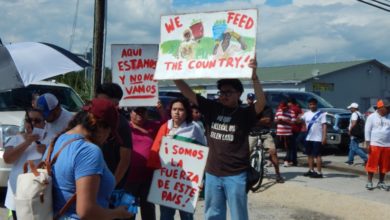On October 7, protesters gathered in front of immigration and Customs Enforcement headquarters in Washington, D.C. for a candlelight vigil in response to the death of a 37-year-old Cameroonian asylum seeker who died in ICE custody. Nebane Abienwi died on Tuesday, October 1, and was the ninth migrant to die in ICE custody since last September as part of a clear pattern of racist brutality by the agency.
After traveling to the southern border of the United States, Abienwi entered through the San Ysidro Port of Entry and applied for asylum on September 5. He was then imprisoned in San Diego’s Otay Mesa Detention Center and, according to records given to Congress, hospitalized on September 26. He died five days later, on October 1.
Organizer Sylvie Bello expanded on the lack of information and the terror these deaths spread in immigrant communities, saying “Please, please join us. He’s out there cold in San Diego and ICE has him. We don’t know what they’ve done with him. We have so many questions and that’s why together with our friends, with our allies, with our comrades, with our many, many loved ones, who you may not see today because they are scared … that’s why a lot of our friends, a lot of his friends, a lot of his family were very reluctant to come out because they don’t know what ICE is gonna do. Because they don’t know what ICE has done to him.”
Many migrants were in attendance at the vigil and spoke about deaths of people from Sierra Leone, Jamaica and Trinidad among other nations. Numerous speakers said how frustrated, angry and tired they were of death after death and vigil after vigil. Several highlighted that we have to fight back. One migrant activist who wished to remain anonymous said, “We’ll be here 10 deep, then 20 deep, then 100 deep. When there’s thousands of us on this street in front of ICE, they’re going to be out of excuses.”
One attendee, Daniel Alvarenga, emphasized the solidarity across nationalities in immigrant communities. “I’m Salvadoran and a part of the Central American community and we’ve had several people die in U.S. ICE custody at the border … the same things are happening to African migrants at the border now that are happening to Central Americans, if not worse.”
Bello, an organizer of the event with Cameroon American Council, explained more about the reasons that Abienwi was seeking asylum in the United States. “Neba was fleeing, I’m sure, if he’s gonna come through the southern border, one of five crises in Cameroon. The first crisis right now in Neba’s Bafut homeland is the Anglophone crisis, which is a direct direct direct outbreak from oppressive colonial exploitation between the French and the British in Cameroon. We also have Boko Haram from Nigeria. We also have terrorism from Central Africa into Cameroon. That’s the third conflict. The fourth conflict is the presidential election took place in 2018. The fifth conflict is brewing and it’s the cultural, ethnic, and religious wars happening also in the northwest region, where Abienwi is from.”
Ola Osaze of Black LGBTQ Migrants Project discussed the process of displacement during the vigil. “As Black people, because of anti-Blackness, because of the legacy of colonization, there’s no safe place on this earth for us. Even our homes. Either because of colonization by the British or Germans or because of the new form of colonization that the US makes possible and makes our lands unliveable. Because of this, many of us are forced to leave our homelands.”





